I need help with creating code for stack by means of an arra
I need help with creating code for \'stack by means of an array\'
I have created the header files to start the cpp file.
ArrayStack.h:
#include <iostream>
#include \"RuntimeException.h\"
#include \"StackException.h\"
#ifndef ArrayStack_h
#define ArrayStack_h
template
class ArrayStack {
enum { DEF_CAPACITY = 100 }; // default stack capacity
public:
ArrayStack(int cap = DEF_CAPACITY); // constructor from capacity
int size() const; // number of items in the stack
bool empty() const; // is the stack empty?
const E& top() const throw(StackEmpty); // get the top element
void push(const E& e) throw(StackFull); // push element onto stack
void pop() throw(StackEmpty); // pop the stack
// ...housekeeping functions omitted
private: // member data
E* S; // array of stack elements
int capacity; // stack capacity
int t; // index of the top of the stack
};
template ArrayStack::ArrayStack(int cap)
: S(new E[cap]), capacity(cap), t(-1) { } // constructor from capacity
template int ArrayStack::size() const
{ return (t + 1); } // number of items in the stack
template bool ArrayStack::empty() const
{ return (t < 0); } // is the stack empty?
template // return top of stack
const E& ArrayStack::top() const throw(StackEmpty) {
if (empty()) throw StackEmpty(\"Top of empty stack\");
return S[t];
}
template // push element onto the stack
void ArrayStack::push(const E& e) throw(StackFull) {
if (size() == capacity) throw StackFull(\"Push to full stack\");
S[++t] = e;
}
template // pop the stack
void ArrayStack::pop() throw(StackEmpty) {
if (empty()) throw StackEmpty(\"Pop from empty stack\");
--t;
}
#endif /* ArrayStack_h */
StackException.h:
#ifndef StackException_h_
#define StackException_h_
#include \"RuntimeException.h\"
// Exception thrown on performing top or pop of an empty stack.
class StackEmpty : public RuntimeException {
public:
StackEmpty(const std::string& err) : RuntimeException(err) {}
};
class StackFull : public RuntimeException {
public:
StackFull(const std::string& err) : RuntimeException(err) {}
};
#endif /* StackException_h */
RuntimeException.h:
#ifndef RUNTIMEEXCEPTION_H
#define RUNTIMEEXCEPTION_H
#include <string>
class RuntimeException {
// generic run-time exception private:
std::string errorMsg;
public:
RuntimeException(const std::string& err) { errorMsg = err; }
std::string getMessage() const { return errorMsg; }
};
#endif
I have started the \"stack.cpp\" with followings:
#include <iostream>
#include <string>
#include \"ArrayStack.h\"
#include \"LinkedStack.h\"
#include \"StackException.h\"
using namespace std;
int main()
{
return EXIT_SUCCESS;
}
In the main function, I need to create a code for the following:
1) Modify the “main()” in “stack.cpp” to declare an “ArrayStack” of integer type. Execute the interface commands below in order:
a. push(7)
b. push(13);
c. print the top elements
d. pop()
e. push(9)
f. print the top element
g. print the top element
h. pop();
Anyone would like to help me out here? Thank you
Solution
// There were some issue with template in your code which I have fixed
here are four files
// ArrayStack.h
#include <iostream>
#include \"RuntimeException.h\"
#include \"StackException.h\"
#ifndef ArrayStack_h
#define ArrayStack_h
template <class E>
class ArrayStack {
enum { DEF_CAPACITY = 100 }; // default stack capacity
public:
ArrayStack(int cap = DEF_CAPACITY); // constructor from capacity
int size() const; // number of items in the stack
bool empty() const; // is the stack empty?
const E& top() const throw(StackEmpty); // get the top element
void push(const E& e) throw(StackFull); // push element onto stack
void pop() throw(StackEmpty); // pop the stack
// ...housekeeping functions omitted
private: // member data
E* S; // array of stack elements
int capacity; // stack capacity
int t; // index of the top of the stack
};
template <class E>
ArrayStack<E>::ArrayStack(int cap) : S(new E[cap]), capacity(cap), t(-1) { } // constructor from capacity
template <class E>
int ArrayStack<E>::size() const
{ return (t + 1); } // number of items in the stack
template <class E>
bool ArrayStack<E>::empty() const
{ return (t < 0); } // is the stack empty?
template <class E> // return top of stack
const E& ArrayStack<E>::top() const throw(StackEmpty) {
if (empty()) throw StackEmpty(\"Top of empty stack\");
return S[t];
}
template <class E> // push element onto the stack
void ArrayStack<E>::push(const E& e) throw(StackFull) {
if (size() == capacity) throw StackFull(\"Push to full stack\");
S[++t] = e;
}
template <class E> // pop the stack
void ArrayStack<E>::pop() throw(StackEmpty) {
if (empty()) throw StackEmpty(\"Pop from empty stack\");
--t;
}
#endif /* ArrayStack_h */
// StackException.h
#ifndef StackException_h_
#define StackException_h_
#include \"RuntimeException.h\"
// Exception thrown on performing top or pop of an empty stack.
class StackEmpty : public RuntimeException {
public:
StackEmpty(const std::string& err) : RuntimeException(err) {}
};
class StackFull : public RuntimeException {
public:
StackFull(const std::string& err) : RuntimeException(err) {}
};
#endif /* StackException_h */
// RuntimeException.h
#ifndef RUNTIMEEXCEPTION_H
#define RUNTIMEEXCEPTION_H
#include <string>
class RuntimeException {
// generic run-time exception private:
std::string errorMsg;
public:
RuntimeException(const std::string& err) { errorMsg = err; }
std::string getMessage() const { return errorMsg; }
};
#endif
// stack.cpp
#include <iostream>
#include <string>
#include \"ArrayStack.h\"
#include <stdlib.h>
#include \"StackException.h\"
using namespace std;
int main()
{
ArrayStack<int> arrayStack;
arrayStack.push(7);
arrayStack.push(13);
cout << \"Top element is : \" << arrayStack.top() << endl;
arrayStack.pop();
arrayStack.push(9);
cout << \"Top element is : \" << arrayStack.top() << endl;
cout << \"Top element is : \" << arrayStack.top() << endl;
arrayStack.pop();
return EXIT_SUCCESS;
}
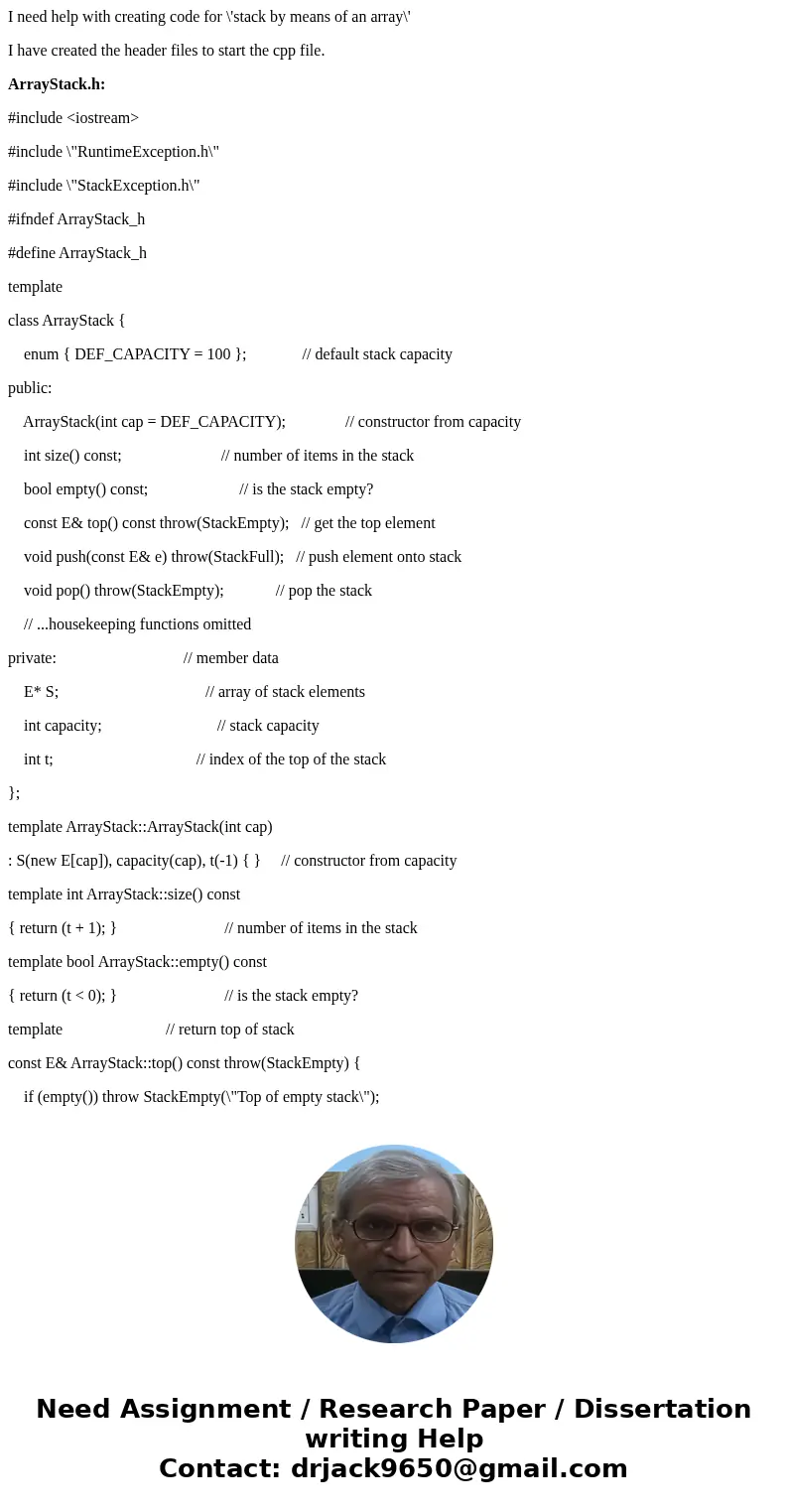
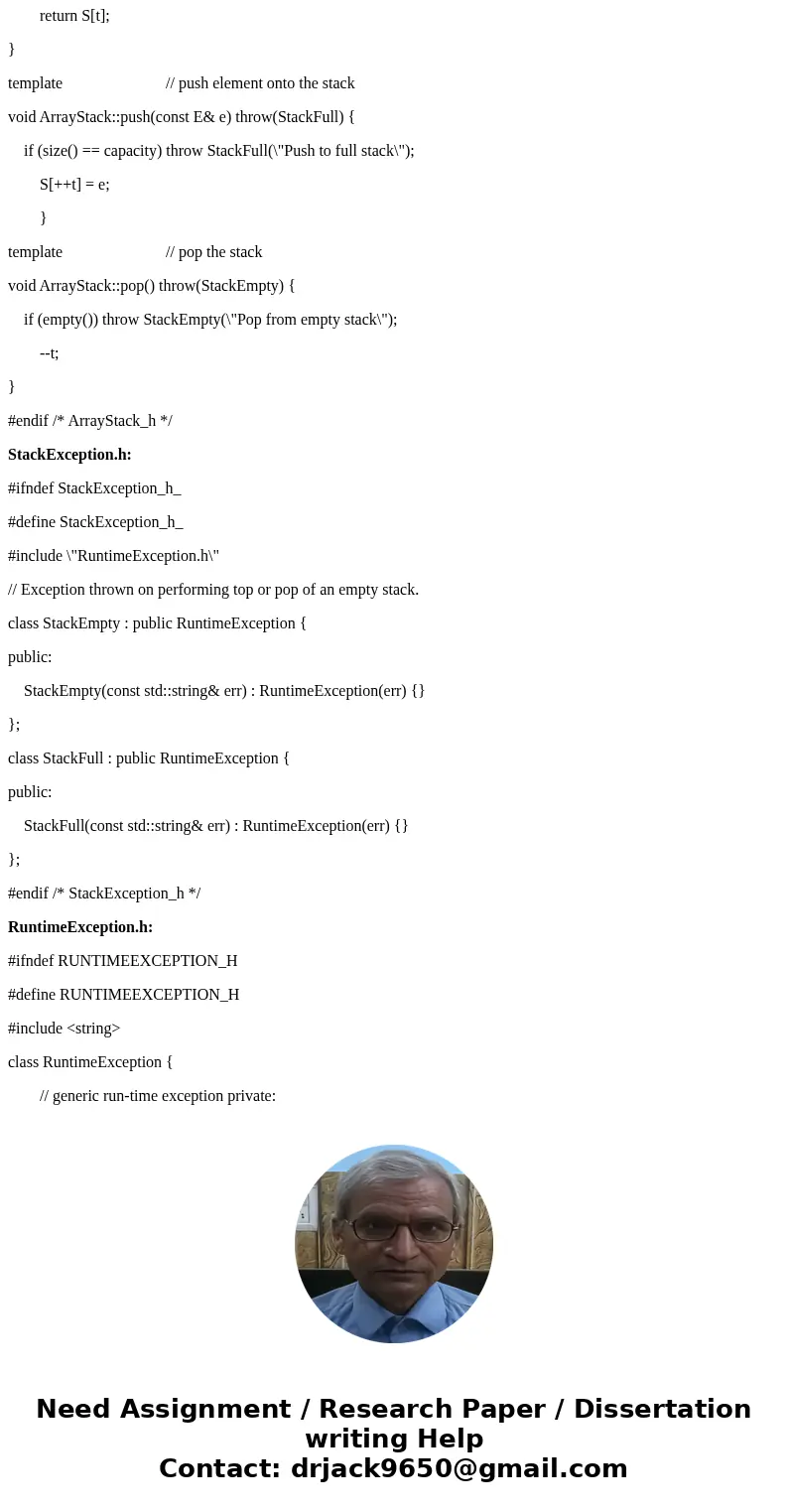
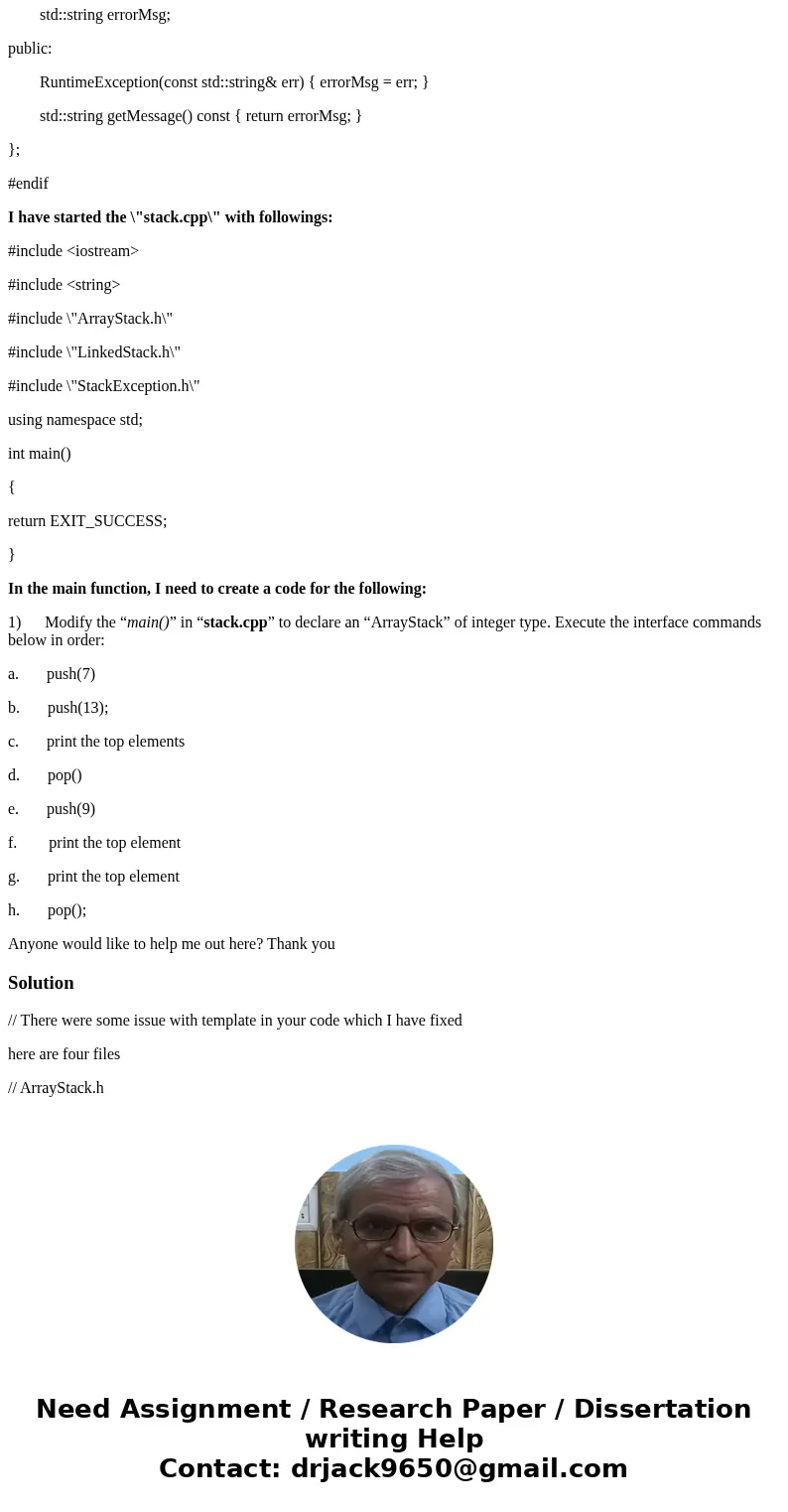
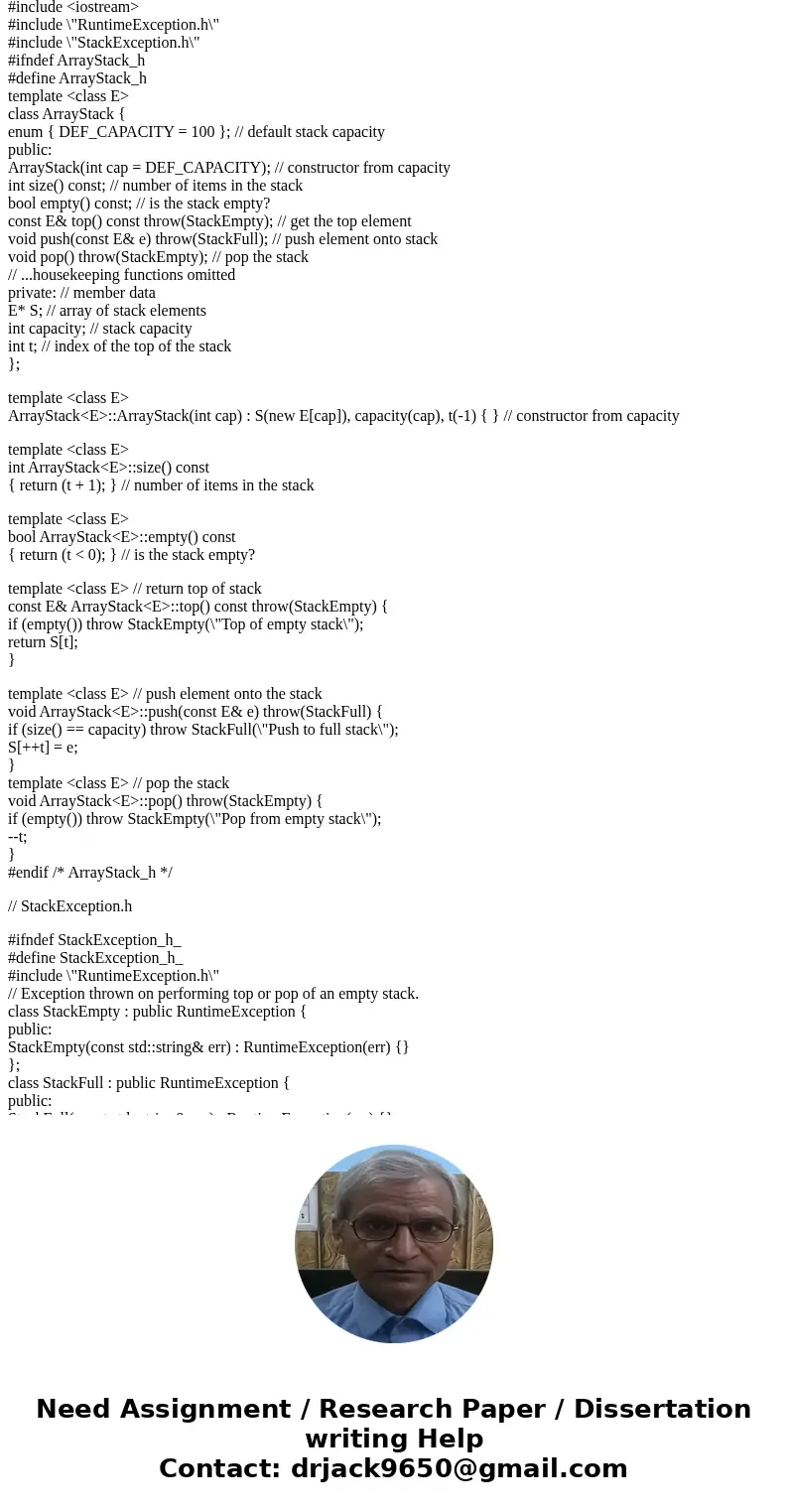
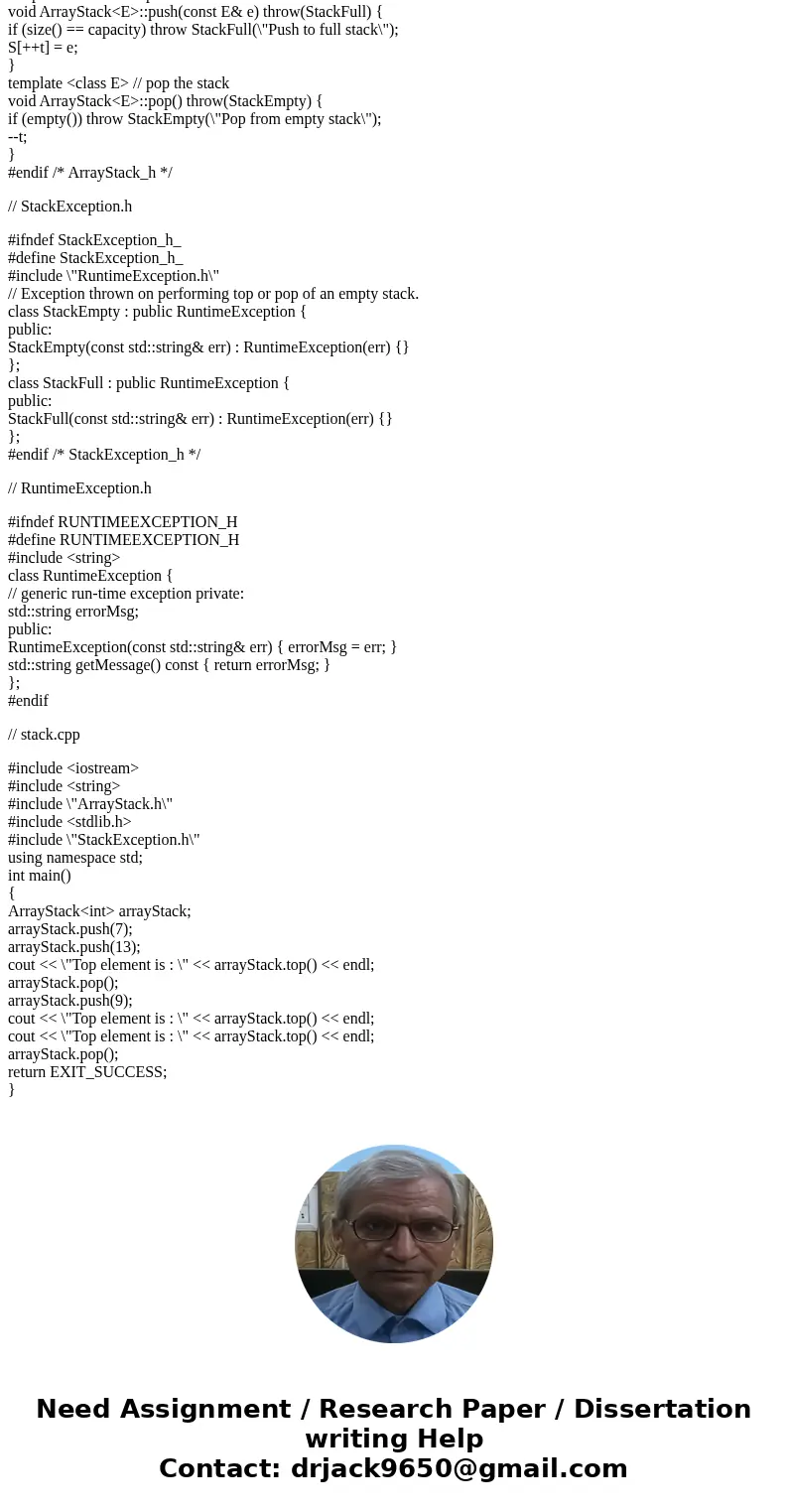
 Homework Sourse
Homework Sourse